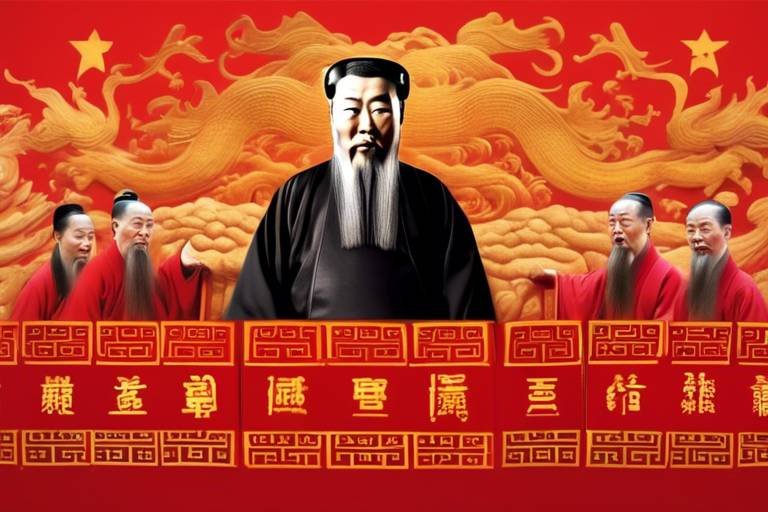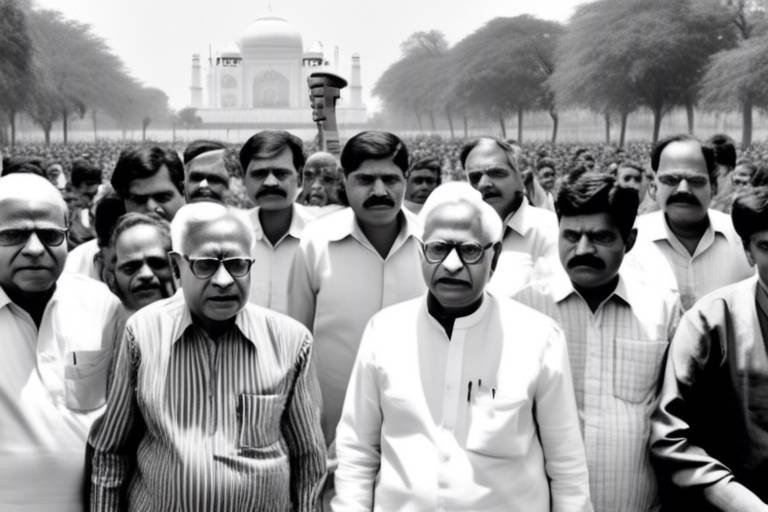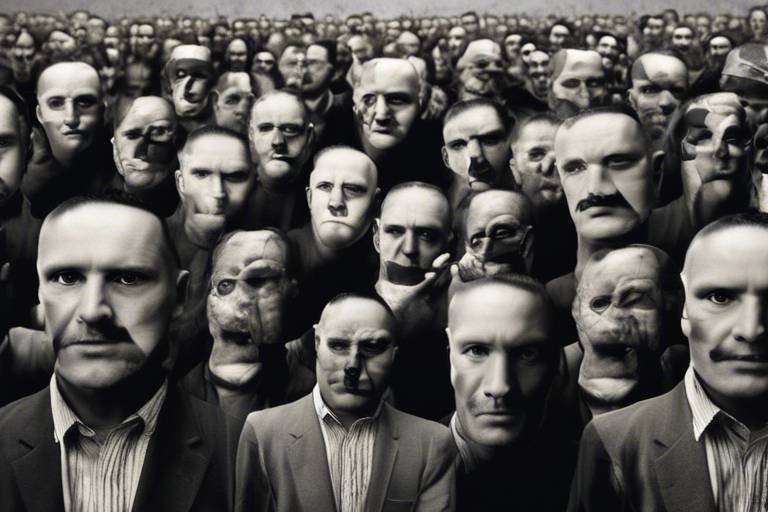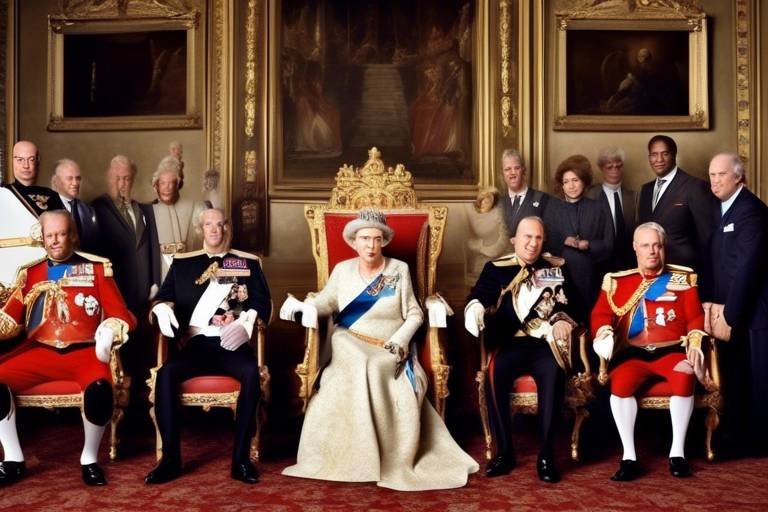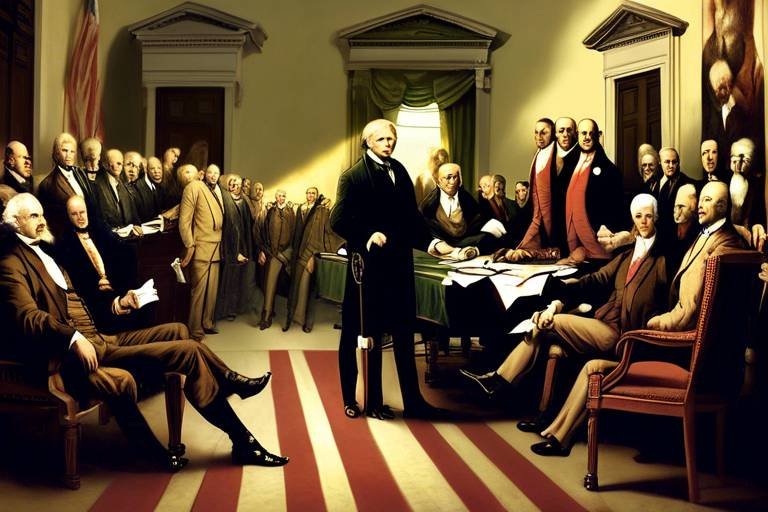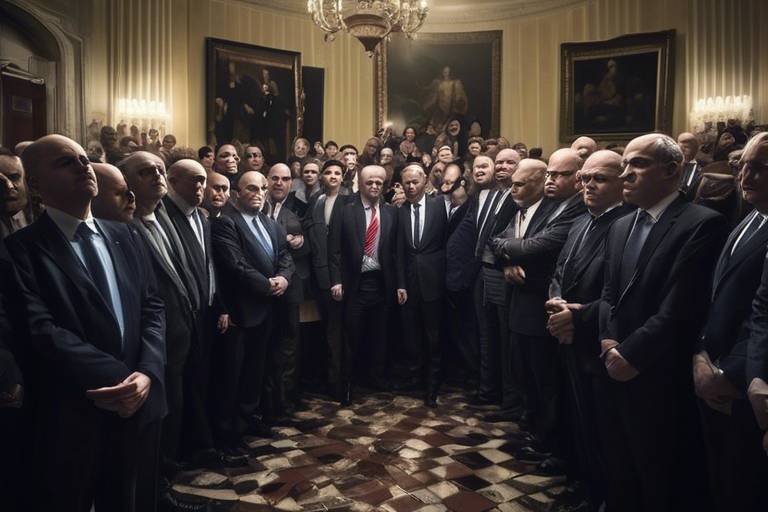Is There a Philosophy in Hegemonic Politics?
When we dive into the realm of hegemonic politics, we often encounter a complex interplay between power, ideology, and philosophical thought. But, is there a deeper philosophy that underpins these political dynamics? The answer is a resounding yes! Philosophy not only shapes our understanding of power but also influences how it is exercised and legitimized across different societies. In this article, we will explore the intricate relationship between philosophical frameworks and hegemonic politics, revealing how these ideas impact global governance and the balance of power.
Hegemony, at its core, refers to the dominance of one group over others, not just through coercion but also through consent and ideological control. This concept extends beyond mere political dominance; it encompasses cultural and social influence as well. To understand hegemony, we must first consider how philosophical ideas inform our perceptions of authority, legitimacy, and governance. Philosophy acts as a lens through which we view the world, shaping our beliefs about what constitutes rightful rule and the nature of power itself.
Consider this: when a nation asserts its dominance on the global stage, it doesn't just rely on military might or economic strength; it also engages in a battle of ideas. This is where philosophy comes into play. The philosophical underpinnings of a hegemonic power can dictate its approach to international relations, influencing everything from diplomatic strategies to military interventions. For instance, a country that espouses democratic ideals may seek to promote those values worldwide, framing its actions as a moral obligation. In contrast, a regime that prioritizes authoritarian control may justify its actions through a different philosophical narrative, emphasizing stability and order over individual freedoms.
As we navigate through the nuances of hegemonic politics, it becomes clear that philosophy is not just an abstract concept but a practical tool that shapes political realities. It raises critical questions about the nature of power: What makes a government legitimate? How do ideologies gain traction in society? And, importantly, how do these ideologies influence the acceptance of hegemonic rule? The answers to these questions lie within the philosophical frameworks that underpin our political systems.
In the following sections, we will delve deeper into the various philosophical foundations that inform hegemonic politics, exploring how ideas like realism and constructivism shape our understanding of power dynamics. We will also examine the role of ideology in legitimizing hegemonic power and the conflicts that arise from competing ideologies. Through this exploration, we aim to uncover the philosophical threads that weave together the fabric of hegemonic politics, revealing the profound implications for global governance.
- What is hegemony? Hegemony refers to the dominance of one group over others, achieved not only through force but also through the consent and ideological influence of the dominated.
- How does philosophy influence hegemonic politics? Philosophy provides the foundational ideas about power, authority, and legitimacy, shaping how hegemonic powers operate and justify their actions.
- What role does ideology play in hegemony? Ideology helps to legitimize hegemonic power by framing the narrative around authority and governance, influencing public perception and acceptance.
- Can hegemony exist without consent? While coercion can establish dominance, long-term hegemony relies heavily on the consent of the governed, which is often facilitated through ideological means.

The Concept of Hegemony
Understanding hegemony is crucial for analyzing the intricate web of power structures that govern our world. At its core, hegemony refers to the dominance of one group over others, not just through coercive means, but also through cultural and ideological leadership. It's like the puppet master pulling strings from behind the curtain, where the audience is often unaware of the manipulation taking place. This concept has deep historical roots, tracing back to the ancient empires, but it has evolved significantly over time.
Historically, hegemony was often associated with military dominance, where one state would exert control over others through force. However, in the modern context, it encompasses a broader spectrum of influence, including economic, political, and cultural dimensions. The rise of globalization has further complicated this landscape, as nations navigate their interests in a world that is increasingly interconnected. Think of it as a game of chess, where each move can have ripple effects across the board, affecting not just the players involved, but also the spectators watching from the sidelines.
The significance of hegemony in shaping political landscapes cannot be overstated. It influences how nations interact, how policies are formulated, and even how societies perceive authority. The hegemonic power often sets the rules of the game, dictating what is considered normal or acceptable within the international arena. This leads to a complex relationship between the hegemon and subordinate states, where the latter may adopt the former's ideologies and practices, sometimes willingly and sometimes out of necessity.
To further illustrate the concept, consider the following key aspects of hegemony:
- Power Dynamics: Hegemony is about establishing a power hierarchy where the dominant group maintains control over subordinates.
- Cultural Influence: The hegemon often shapes cultural norms and values, making its ideologies appear universal.
- Economic Control: Economic policies and practices established by the hegemon can dictate the financial health of subordinate states.
In conclusion, the concept of hegemony is multifaceted and deeply embedded in the fabric of political relations. It serves as a lens through which we can examine not just the overt expressions of power, but also the subtle, often invisible forces that shape our world. As we delve deeper into the philosophical underpinnings of hegemony, we begin to uncover the layers of meaning that inform our understanding of authority, legitimacy, and the very nature of power itself.
- What is hegemony? Hegemony refers to the dominance of one group over others through various means, including cultural, ideological, and economic influence.
- How does hegemony affect international relations? Hegemony shapes how nations interact, influencing policies and the acceptance of norms within the global community.
- What are some historical examples of hegemony? Historical examples include the Roman Empire, British colonialism, and the United States' influence in the post-World War II era.

Philosophical Foundations of Power
When we dive into the , we encounter a rich tapestry woven with ideas that have shaped political thought for centuries. Philosophy is not just an abstract discipline; it serves as the bedrock upon which our understanding of power, authority, and legitimacy is built. At its core, the exploration of power involves asking fundamental questions: What is power? How is it acquired? And, perhaps most importantly, how is it justified? These questions are crucial for grasping the dynamics of hegemonic politics.
To unpack this complex relationship, we can look at several key philosophical ideas that have informed political theories over time. For instance, the concept of the social contract posits that individuals consent, either explicitly or implicitly, to surrender some of their freedoms to an authority in exchange for protection of their remaining rights. This framework not only legitimizes the authority of the state but also raises questions about the limits of power and the responsibilities of those in charge. Think of it as a delicate balance, like a tightrope walker carefully navigating between chaos and order.
Furthermore, the ideas of John Locke and Thomas Hobbes provide contrasting views on human nature and governance. Locke believed in the inherent goodness of people and argued for a government that derives its power from the consent of the governed. In contrast, Hobbes viewed humans as naturally self-interested and believed that a strong, centralized authority was necessary to prevent societal collapse. These philosophical perspectives highlight how different understandings of human nature can lead to vastly different political structures and power dynamics.
In addition to these foundational theories, the role of ideology cannot be overlooked. Ideologies serve as lenses through which we interpret political events and power relations. They shape our beliefs and values, influencing everything from policy decisions to international relations. For example, the rise of liberalism in the 18th and 19th centuries emphasized individual rights and freedoms, fundamentally altering the landscape of political power. This ideological shift challenged existing hegemonic structures and paved the way for new forms of governance.
Moreover, the interplay between power and ideology is often manifested in the concept of legitimacy. A government may hold power, but its authority is only sustained through the perception of legitimacy among its citizens. This is where philosophical inquiry becomes essential; it prompts us to consider what makes a regime legitimate in the eyes of the people. Is it the rule of law, democratic processes, or perhaps the promotion of social welfare? The answers vary widely across different cultures and historical contexts, making this a fascinating area of study.
As we navigate the philosophical foundations of power, we must also consider the ethical implications of wielding power. The question arises: Should power be concentrated in the hands of a few, or should it be distributed more equitably? Philosophers like John Rawls have argued for principles of justice that advocate for the fair distribution of resources and opportunities, challenging hegemonic practices that perpetuate inequality. This ongoing debate highlights the necessity for a philosophical lens in understanding and critiquing power structures.
In conclusion, the philosophical foundations of power are not merely academic; they are deeply intertwined with the fabric of our societies. They influence how we view authority, governance, and social justice. By understanding these philosophical underpinnings, we can better navigate the complexities of hegemonic politics and advocate for a more just and equitable world.
- What is hegemony? Hegemony refers to the dominance of one group over others, often maintained through cultural and ideological means.
- How does philosophy influence politics? Philosophy provides frameworks for understanding power dynamics, legitimacy, and governance, shaping political theories and practices.
- Who are some key philosophers in political theory? Notable philosophers include John Locke, Thomas Hobbes, and Antonio Gramsci, each contributing unique perspectives on power and authority.
- What is the significance of ideology in politics? Ideology shapes our beliefs and values, influencing political discourse and the acceptance of power structures.

Realism and Hegemony
Realism is a powerful lens through which we can examine the intricate dance of hegemony in global politics. At its core, realism posits that the world is a competitive arena where states act primarily in their own self-interest. This perspective is crucial for understanding how hegemonic powers navigate their dominance and influence over others. Realist theorists argue that the pursuit of power is not just a political necessity but a fundamental aspect of human nature. This belief shapes the strategies employed by states as they vie for supremacy on the world stage.
In the context of hegemonic politics, realism provides a framework that emphasizes the importance of military strength, economic resources, and strategic alliances. Hegemonic states often leverage these elements to maintain their position and deter potential challengers. The implications of this are profound: as a hegemon consolidates power, it can dictate the rules of the game, shaping international norms and expectations. For instance, the United States' post-World War II dominance established a liberal order that many nations adhered to, not merely out of agreement but out of necessity.
One of the most compelling aspects of realism is its focus on the anarchic nature of the international system. Unlike domestic politics, where laws and governance structures provide order, the international arena lacks a central authority. This absence of overarching governance means that states must rely on their capabilities to secure their interests. Hegemonic powers, therefore, become crucial players in establishing a semblance of order, even if that order serves their own interests above all else.
Moreover, realism posits that power is not static; it is dynamic and fluid. As the global landscape shifts, so too does the balance of power. Emerging powers can challenge established hegemons, leading to a reconfiguration of alliances and rivalries. This constant evolution raises questions about the sustainability of hegemonic dominance. For example, the rise of China as a potential challenger to U.S. hegemony illustrates how power dynamics can shift dramatically, prompting both nations to recalibrate their strategies.
To further understand the relationship between realism and hegemony, we can consider the insights of notable realist thinkers. Figures such as Hans Morgenthau and Kenneth Waltz have contributed significantly to our understanding of how power operates in the international sphere. Morgenthau's principle of political realism underscores the idea that moral norms cannot be applied to the actions of states in the same way they are applied to individuals. This perspective suggests that hegemonic actions, while often viewed through a moral lens, are ultimately driven by the harsh realities of power politics.
In summary, realism offers a critical perspective on hegemony, highlighting the interplay of power, interest, and strategy in international relations. It prompts us to consider not just the actions of states, but the underlying motivations that drive them. As we continue to navigate an increasingly complex global landscape, understanding the realist perspective on hegemony becomes essential for deciphering the motives and actions of powerful states.
- What is the main idea of realism in politics? Realism emphasizes the competitive nature of international relations, asserting that states act primarily in their self-interest to secure power and maintain survival.
- How does realism relate to hegemony? Realism explains how hegemonic powers use their military and economic strength to maintain dominance and influence over other states in the anarchic international system.
- Can hegemonic power change over time? Yes, hegemonic power is not static; it can shift as emerging powers challenge established ones, leading to changes in global alliances and power dynamics.

Machiavelli's Influence
When we think about the intricate dance of power, Machiavelli often comes to mind as the ultimate maestro. His seminal work, The Prince, serves as a guide for political leaders navigating the tumultuous waters of governance. But what exactly makes Machiavelli's influence so profound in the realm of hegemonic politics? To put it simply, Machiavelli's ideas are like a double-edged sword, offering both a pragmatic approach to power and a stark reminder of the moral ambiguities involved in its pursuit.
At the heart of Machiavelli's philosophy lies the notion that the ends often justify the means. This perspective is particularly resonant in hegemonic politics, where leaders may resort to manipulation, coercion, or even deceit to maintain their grip on power. In a world where survival of the fittest reigns supreme, Machiavelli's assertion that a ruler must be both a fox and a lion—cunning yet strong—has become a guiding principle for many modern states. Essentially, he teaches that to navigate the complexities of political life, one must be adaptable, ready to shift strategies as circumstances change.
Moreover, Machiavelli's insights extend beyond mere tactics; they delve into the psychology of leadership. He emphasizes the importance of perception in politics. A leader's public image can be as crucial as their actual capabilities. This is where the concept of virtù comes into play—an amalgamation of qualities that a ruler must possess to achieve greatness. It's not just about being powerful; it's about being perceived as powerful. This understanding is vital for hegemonic powers that seek to project strength and stability, not just at home but also on the global stage.
To illustrate Machiavelli's enduring relevance, consider the following table that outlines key themes from his work and their implications in contemporary politics:
| Theme | Implication in Hegemonic Politics |
|---|---|
| Ends Justify the Means | Leaders may employ unethical tactics for perceived greater good. |
| Importance of Perception | Public image can dictate a leader's effectiveness and stability. |
| Adaptability | Successful leaders must adjust strategies based on changing circumstances. |
| Virtù | A leader's qualities can significantly influence their power and influence. |
In summary, Machiavelli's influence on hegemonic politics is undeniable. His ideas challenge us to reconsider the moral landscape of power dynamics. In a world where political leaders often face dilemmas that blur ethical lines, Machiavelli's pragmatic approach provides a lens through which we can better understand the actions of those in power. It's a reminder that behind every political maneuver lies a complex interplay of strategy, perception, and the relentless pursuit of dominance.
- What is Machiavelli best known for? Machiavelli is best known for his work The Prince, which discusses political power and leadership.
- How does Machiavelli's philosophy apply to modern politics? His ideas about the ends justifying the means and the importance of perception are still relevant in contemporary political strategies.
- What does Machiavelli mean by 'virtù'? 'Virtù' refers to the qualities and skills a leader must possess to achieve success and maintain power.

Modern Realist Thinkers
When we delve into the realm of modern realist thinkers, we're stepping into a world where power dynamics and state interests reign supreme. Realism, as a dominant theory in international relations, is characterized by a skeptical view of human nature and a pragmatic approach to politics. Thinkers like Hans Morgenthau, Kenneth Waltz, and John Mearsheimer have shaped this discourse, each bringing their unique perspectives to the table.
Hans Morgenthau, often regarded as the father of modern realism, emphasized the idea that politics is governed by objective laws rooted in human nature. His seminal work, Politics Among Nations, posits that the struggle for power is an inherent aspect of international relations. Morgenthau argued that moral norms cannot be applied to the actions of states, as their primary objective is to secure their own survival and interests. This perspective has profound implications for understanding hegemonic politics, as it suggests that states will act ruthlessly to maintain their dominance.
Moving on, Kenneth Waltz introduced the concept of structural realism, which shifts the focus from human nature to the international system itself. In his influential book, The Theory of International Politics, he argued that the anarchic structure of the international system compels states to prioritize their security and power. This structural approach helps explain why hegemonic powers often engage in balancing behaviors, forming alliances, and sometimes even resorting to conflict to maintain their status. Waltz's ideas challenge the notion that states act solely based on internal motivations, highlighting the importance of external pressures in shaping their actions.
John Mearsheimer further develops these themes with his theory of offensive realism, which posits that great powers are inherently driven to seek dominance. In his work, The Tragedy of Great Power Politics, Mearsheimer argues that the anarchic nature of the international system encourages states to pursue hegemony as a means of ensuring their survival. This perspective aligns closely with the concept of hegemonic politics, as it underscores the aggressive strategies that states may employ in their quest for power. Mearsheimer's insights are particularly relevant in today's geopolitical climate, where we witness the rise of China and the resurgence of Russia as they challenge the existing order.
In addition to these foundational thinkers, contemporary scholars continue to expand the realist framework. For instance, Robert J. Art and Stephen M. Walt have contributed significantly to the discourse by examining how realism interacts with other theories and the complexities of modern conflicts. Their works illustrate that while the core tenets of realism remain relevant, the evolving nature of global politics necessitates a nuanced understanding of state behavior.
Ultimately, modern realist thinkers provide us with critical tools to analyze hegemonic politics. They remind us that power is not merely a game of chess played by states; it is a complex interplay of interests, strategies, and historical contexts. By understanding their contributions, we can better grasp the intricacies of international relations and the ongoing struggles for dominance that shape our world.

Constructivism and Hegemony
When we think about hegemony, it's easy to get lost in the traditional narratives of power and dominance. However, constructivism offers a fresh perspective that challenges these conventional views. At its core, constructivism emphasizes the importance of social constructs, identities, and norms in shaping political reality. Unlike realism, which focuses primarily on material power and state behavior, constructivism dives deeper into the underlying beliefs and values that drive political actions. This approach posits that the way we perceive power is not just about who has the most military might or economic resources, but also about how identities and relationships are constructed and understood.
In the realm of hegemonic politics, constructivism reveals how ideologies and shared understandings can legitimize or delegitimize power structures. For instance, a hegemonic power might maintain its dominance not just through coercion or economic superiority, but by shaping the norms and values that govern international relations. This can be seen in how certain countries promote democracy and human rights as universal values, thereby framing their actions as morally justified while delegitimizing the practices of others. The narrative becomes a powerful tool in the arsenal of hegemony.
Moreover, constructivism highlights the role of identity in international relations. Hegemonic powers often construct their identities in ways that resonate with other states or groups, creating a sense of belonging or shared purpose. This can lead to the formation of alliances based on common values or beliefs rather than just strategic interests. For example, the United States has often positioned itself as a leader of the "free world," appealing to nations that share similar democratic ideals. This identity construction not only reinforces its hegemonic status but also influences the behavior of other states.
To illustrate this further, consider the following table that summarizes the key differences between realism and constructivism in the context of hegemony:
| Aspect | Realism | Constructivism |
|---|---|---|
| Focus | Material power and state behavior | Social constructs, identities, and norms |
| View of Hegemony | Dominance through coercion | Legitimacy through shared values |
| Key Drivers | Military and economic strength | Identity and social relationships |
| International Relations | Zero-sum game | Cooperative and competitive dynamics |
In conclusion, constructivism not only enriches our understanding of hegemony but also opens up new avenues for analyzing global politics. By focusing on how identities and norms shape power dynamics, constructivism challenges us to reconsider the foundations of political authority and the mechanisms through which hegemonic powers maintain their status. As we navigate through the complexities of international relations, it becomes increasingly clear that the stories we tell and the identities we construct are just as vital as the material conditions that define our world.
Q1: What is the main difference between realism and constructivism in international relations?
A1: The main difference lies in their focus; realism emphasizes material power and state behavior, while constructivism highlights the importance of social constructs, identities, and norms in shaping political realities.
Q2: How does constructivism explain the legitimacy of hegemonic power?
A2: Constructivism explains legitimacy through the lens of shared values and norms. A hegemonic power can maintain its dominance by framing its actions as morally justified based on widely accepted ideologies.
Q3: Can you provide an example of constructivism in action?
A3: An example would be how the United States promotes democracy and human rights as universal values, thereby legitimizing its actions on the global stage and influencing the behavior of other nations.

The Role of Ideology in Hegemony
Ideology is not just a collection of beliefs; it is the very fabric that weaves together the motivations and justifications for hegemonic power. In the realm of politics, ideology serves as a powerful tool that legitimizes authority and shapes the perceptions of the governed. When we think about hegemony, it’s essential to understand how ideologies operate on both macro and micro levels, influencing everything from global policies to everyday social interactions. Dominant ideologies can create a sense of normalcy, making certain power structures seem not just acceptable but inevitable.
At its core, ideology functions as a narrative that explains why a particular political order is in place. It fosters a shared understanding among the populace, allowing them to internalize the values and beliefs that support the hegemonic regime. This is crucial because without a unifying ideology, a hegemonic power risks losing its grip on authority. For instance, consider how different political systems promote varying ideologies:
| Political System | Dominant Ideology | Impact on Hegemony |
|---|---|---|
| Democracy | Liberalism | Encourages participation and legitimizes power through consent. |
| Authoritarianism | Nationalism | Justifies control through the idea of national unity and security. |
| Communism | Marxism | Claims to represent the working class while suppressing dissent. |
Each of these ideologies not only supports the existing power structures but also shapes the way people perceive their roles within society. For instance, in a democratic system, the ideology of liberalism promotes the idea that every individual has a voice, which can empower citizens to engage in political processes. In contrast, authoritarian regimes often utilize nationalism to foster loyalty among citizens, framing dissent as a threat to national integrity.
Moreover, ideology plays a vital role in the creation and maintenance of alliances within hegemonic politics. When states share a common ideological framework, it becomes easier to forge partnerships and collaborate on international issues. Take, for example, the ideological alignment among Western nations during the Cold War, where the shared belief in capitalism and democracy helped to solidify alliances against the perceived threat of communism. This ideological cohesion not only strengthened their collective power but also marginalized alternative viewpoints, effectively sidelining competing ideologies.
However, it's important to recognize that ideologies are not static; they evolve over time in response to social changes and challenges. The rise of populism in various parts of the world illustrates how discontent with existing hegemonic ideologies can manifest into powerful movements that disrupt the status quo. These populist movements often draw on a mix of nationalist, socialist, or even anti-establishment sentiments, showcasing the dynamic nature of ideology in shaping political landscapes.
In conclusion, ideology is a cornerstone of hegemonic politics, acting as both a legitimizing force and a tool for social cohesion. By understanding the role of ideology, we can better grasp the complexities of power dynamics and the ongoing struggles between competing narratives. As we move forward, it’s crucial to remain aware of how emerging ideologies might challenge existing hegemonic structures and reshape the political landscape.
- What is hegemony? Hegemony refers to the dominance of one group over others, particularly in political and social contexts, often maintained through ideological means.
- How does ideology legitimize power? Ideology legitimizes power by providing a framework that explains and justifies the existing political order, making it seem natural and acceptable.
- Can ideologies change over time? Yes, ideologies are not fixed; they can evolve in response to social, political, and economic changes, leading to shifts in power dynamics.

Gramsci and Cultural Hegemony
When we dive into the world of Antonio Gramsci, we encounter a revolutionary thinker whose ideas have profoundly influenced our understanding of power dynamics. Gramsci introduced the concept of cultural hegemony, a notion that explains how dominant groups maintain their power not just through political or economic means, but through cultural institutions and ideologies. This concept is essential for grasping how societal norms and values can be manipulated to sustain the status quo, often without the need for overt coercion.
At the heart of Gramsci's theory is the idea that culture plays a pivotal role in shaping our beliefs and perceptions. He argued that the ruling class exerts its influence by promoting a worldview that benefits its interests. This process occurs through various channels such as education, media, and religion, which help to propagate the dominant ideology. In this way, cultural hegemony ensures that the values and interests of the few become the accepted norms for the many. Gramsci's insights remind us that power is not merely a matter of force; it is also about consent.
To illustrate this further, consider how popular culture often reflects and reinforces the values of the dominant class. For example, movies and television shows frequently portray lifestyles and aspirations that align with the interests of the elite, subtly shaping public perception and acceptance. This is not just a coincidence; it is a strategically crafted narrative that serves to legitimize existing power structures.
Gramsci also emphasized the importance of counter-hegemonic movements. These movements arise when marginalized groups challenge the dominant ideology, seeking to create alternative narratives that resonate with their experiences and aspirations. This struggle is crucial for social change, as it disrupts the complacency fostered by cultural hegemony. By promoting new ideas and values, these movements can shift public consciousness and potentially alter the balance of power.
In contemporary politics, we can observe the relevance of Gramsci's ideas in various contexts. For instance, the rise of social media has provided a platform for counter-hegemonic voices to emerge, challenging traditional narratives propagated by mainstream media. Activists and grassroots organizations leverage these tools to amplify their messages, creating a more pluralistic discourse that can contest hegemonic power.
| Key Concepts of Gramsci's Cultural Hegemony | Description |
|---|---|
| Cultural Hegemony | The dominance of one social class over others, achieved through cultural means. |
| Consent | The process by which the dominated accept the values and norms of the ruling class. |
| Counter-Hegemony | Movements that challenge the dominant ideology and seek to promote alternative narratives. |
In conclusion, Gramsci's concept of cultural hegemony provides a critical lens through which we can analyze the intricate relationship between culture and power. By understanding how dominant ideologies are perpetuated, we can better appreciate the complexities of political dynamics in our global society. As we navigate through the challenges of modern governance, Gramsci's insights remind us that the struggle for power is not just fought in the political arena, but also in the cultural sphere.
- What is cultural hegemony? Cultural hegemony is the dominance of one social class's values and beliefs over others, achieved through cultural institutions.
- How does Gramsci's theory apply today? Gramsci's theory applies to contemporary politics through the rise of social media and counter-hegemonic movements that challenge dominant narratives.
- Why is consent important in Gramsci's theory? Consent is crucial because it highlights how the dominated groups accept and internalize the values of the ruling class, often without realizing it.

Ideological Conflicts and Hegemony
In the complex tapestry of global politics, ideological conflicts play a pivotal role in shaping hegemonic power dynamics. At the heart of these conflicts lies a struggle for dominance, where competing ideologies vie for acceptance and legitimacy. This clash of ideas often influences not only international relations but also domestic policies, creating a ripple effect that can alter the course of nations. Have you ever wondered how a single ideology can sway the fate of millions? The answer lies in the intricate relationship between ideology and hegemony.
Hegemony is not merely about military might or economic superiority; it is deeply intertwined with the cultural and ideological narratives that dominate a society. When one ideology becomes predominant, it often marginalizes others, leading to conflicts that can escalate into broader confrontations. For instance, the tension between liberal democracy and authoritarianism illustrates how ideological differences can create rifts between nations. These ideological battles can manifest in various forms, including:
- Political Alliances: Nations often align themselves with ideologies that resonate with their national interests, forming blocs that can either support or challenge hegemonic powers.
- Social Movements: Grassroots movements can arise to challenge the prevailing ideology, seeking to reshape societal norms and values.
- International Institutions: Organizations like the United Nations often become battlegrounds for ideological conflicts, where member states push for policies that reflect their ideological beliefs.
Moreover, these ideological conflicts can lead to significant consequences on the global stage. For example, the ideological divide during the Cold War not only defined the political landscape of the time but also influenced military strategies, economic policies, and cultural exchanges. The struggle between capitalism and communism was not just a political rivalry; it was a profound ideological conflict that shaped nations' identities and their place in the world.
In contemporary times, we witness similar ideological battles. The rise of populism in various parts of the world challenges the established norms of global governance and liberal democracy. This shift raises questions about the future of hegemony: will it adapt to accommodate these new ideologies, or will it resist and stifle them? The answer to this question could redefine the global order as we know it.
Ultimately, understanding the role of ideology in hegemonic politics is crucial for comprehending the complexities of international relations. As ideologies clash, they not only reveal the underlying power struggles but also highlight the importance of dialogue and negotiation in resolving conflicts. In a world where ideological divides seem to widen, fostering a culture of understanding and cooperation becomes imperative for achieving lasting peace and stability.
- What is hegemony? Hegemony refers to the dominance of one group over others, often manifesting through cultural, ideological, or political means.
- How do ideological conflicts impact global politics? Ideological conflicts can lead to tensions between nations, influence alliances, and shape domestic and international policies.
- What role does culture play in hegemony? Culture is a key component of hegemony, as dominant ideologies often shape societal norms and values, influencing how power is perceived and exercised.
- Can ideological conflicts lead to war? Yes, ideological conflicts can escalate into military confrontations, as seen throughout history during events like the Cold War.
Frequently Asked Questions
-
What is hegemony in political terms?
Hegemony refers to the dominance of one group over others, particularly in political contexts. It involves not just military or economic power, but also the ability to influence ideologies, norms, and social practices that shape the political landscape. Understanding hegemony helps us analyze how power dynamics operate within nations and across the globe.
-
How does philosophy influence hegemonic politics?
Philosophy provides the foundational ideas that shape political theories and practices. It offers frameworks for understanding concepts like power, authority, and legitimacy. By examining philosophical perspectives, we can better grasp how they inform the strategies and justifications used by hegemonic powers in their governance and international relations.
-
What role does realism play in hegemonic politics?
Realism emphasizes the importance of power in international relations, suggesting that states act primarily in their self-interest. This perspective shapes hegemonic politics by highlighting the competitive nature of global interactions, where powerful states seek to maintain their dominance and influence over weaker ones.
-
Who was Machiavelli and why is he relevant to hegemonic politics?
Machiavelli was a Renaissance political philosopher known for his pragmatic approach to power. His ideas about the use of cunning and strategy in politics resonate in contemporary hegemonic practices, where leaders often employ similar tactics to achieve and maintain control over their states and influence on the world stage.
-
What is cultural hegemony according to Antonio Gramsci?
Antonio Gramsci introduced the concept of cultural hegemony, which explains how dominant groups maintain power through cultural means rather than force. This involves shaping societal norms and values to align with their interests, thereby legitimizing their authority and suppressing dissent.
-
How do competing ideologies affect hegemonic power?
Competing ideologies can create significant conflicts within hegemonic politics. These ideological battles can influence international relations and domestic policies, as different groups vie for control over narratives and power. Understanding these conflicts is crucial for analyzing current political climates and the challenges faced by hegemonic powers.


